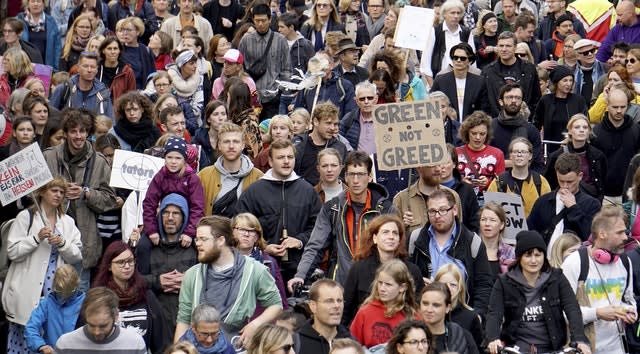German government agrees £48bn climate policy package
The German government has agreed a 54 billion euro (£48 billion) package of measures for tackling climate change.
Chancellor Angela Merkel said the deal agreed by the country’s governing parties after all-night talks represented a major boost for Germany’s efforts to curb greenhouse gas emissions.
Under pressure from environmental protests and a surge in support for the opposition Green party,
Europe’s biggest economy is now aiming to cut emissions by 55% by 2030 compared with 1990 levels
“We believe that we can achieve the goals and that we’ve truly laid the foundations for this,” Mrs Merkel said.

Among the measures is a charge for carbon emissions from transport and heating fuels.
The government plans to introduce a national emissions trading system that will see prices for a ton of carbon dioxide, the main greenhouse gas, start at 10 euros (£8.80) in 2021, rising to 35 euros (£30.90) in 2025.
Experts had earlier said that a starting price of 35 euros was necessary to ensure emissions drop soon.
But German manufacturers — including the country’s powerful car makers — have lobbied against high carbon prices and urged the government to instead support the development of climate-friendly technology.
Other measures agreed include raising the climate charge on airline tickets and investing more in low-emission rail travel, including by reducing the tax on train tickets.
Germany had long been a leader on environmental protection but has lagged behind many European neighbours in recent years and looks set to miss its emissions-cutting targets for 2020 by a wide margin.
The country’s transport sector in particular had failed to keep step with reduction targets.
The government’s cautious climate policy contrasts with the view among most voters that curbing global warming is the most pressing issue of the day.
An estimated 100,000 people in Berlin on #ClimateStrike. Today is massive pic.twitter.com/kSS7NulTx0
— Brian Kahn (@blkahn) September 20, 2019
Students have embraced Swedish teenager activist Greta Thunberg’s weekly protests, holding large rallies — often during school time — in major cities on Fridays that have received widespread support.
A poll by ARD television showed 63% of voters thought the government should prioritise climate protection over economic growth. Only 24% said economic growth should take priority.
On the back of these environmental concerns the Green party has seen a surge in support, coming second in May’s elections for the European Parliament.
Germany’s climate policy is being closely watched elsewhere. The country has the sixth biggest greenhouse gas emissions in the world, with a 2.1% share of the total.
Failure to meet its emissions reduction targets would cost Germany financially. Under European Union rules, the country could be fined billions of euros if it does not meet the bloc’s targets.
The Chancellor has also warned that Germany could lose its position as a technological leader if it does not invest in clean industries.
Mrs Merkel, who was Germany’s environment minister during the first UN climate conference in 1995, has repeatedly called tackling global warming a “vital question for humanity”.
She plans to attend the UN climate summit in New York next week, where she will deliver a speech on Monday.

 Yahoo News
Yahoo News 
